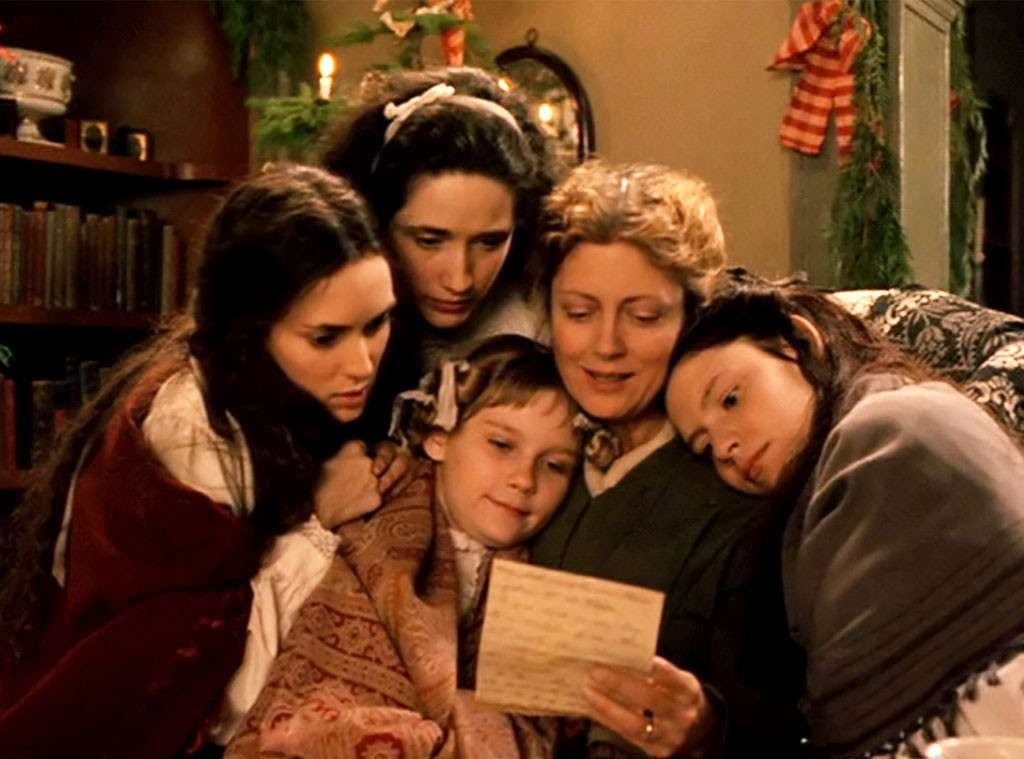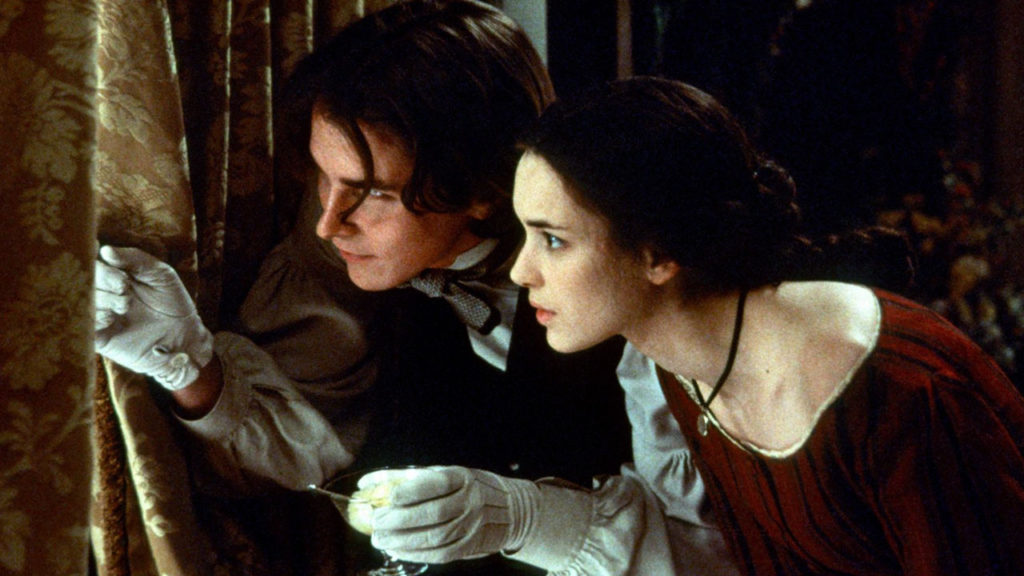Little Women (1994)

DIRECTOR: Gillian Armstrong
CAST: Winona Ryder, Claire Danes, Trini Alvarado, Kirsten Dunst, Samantha Mathis, Christian Bale, Gabriel Byrne, Eric Stoltz, Susan Sarandon
REVIEW:
Little Women is both an unabashedly “feel good” family film and what could be considered a “chick flick”, but the latest onscreen rendition of Louisa May Alcott’s 1868 novel is a handsome and enjoyable production that goes down easily with simple charms bolstered by strong production values and a capable cast. As “girl movies” go, it’s of sufficient quality level that it can be enjoyed by viewers of both genders.
For those unfamiliar with the basics, it centers around the March clan in Concord, Massachusetts, led by matriarch Marmie (Susan Sarandon) who with her husband away in the Civil War, is raising her brood of daughters, strong-willed and imaginative would-be author Josephine “Jo” (Winona Ryder), more sedate Meg (Trini Alvarado), frail Beth (Claire Danes), and bratty Amy (Kirsten Dunst as a child, Samantha Mathis as an adult). As time goes on, the insular circle of sisters is joined by their neighbor Laurie (Christian Bale), who strikes up a close friendship with Jo that may mean something more to Laurie, his tutor John Brooke (Eric Stoltz), who has an eye for Meg, and eventually Friedrich Bhaer (Gabriel Byrne), a kindly German professor who befriends Jo when she goes away to pursue her writing ambitions in New York City.
Little Women is a handsome, technically well-crafted production; period details are convincing, sets and costuming are sumptuous, Geoffrey Simpson captures rich, colorful cinematography (particularly the vibrant Autumn scenes), and Thomas Newman’s stately yet lively score compliments the drama. It’s also about as faithful to the source material as a two hour film is likely to be; there’s some abridging and condensing, and occasionally the dialogue feels conspicuously touched-up for modern sensibilities, such as when the Marches have “opinions” about both Southern slavery and child labor in Northern factories, and when Marmie comes across a little more modern feminist protester than 1800s housewife (granted, Alcott herself was what would probably be considered feminist by 1800s standards, but these minor dialogue add-ons feel a little too obviously speaking more to 1994 than 1868). Unsurprisingly, there’s a central theme about the frustrations of a strong-willed, independent-minded woman who wants something more than being a dutiful housewife and trying to navigate this course in the restrictive 1800s when women could not vote or own property and had limited prospects outside of marriage (Jo publishes her first book under the pen name “Joseph March”), as well as touching a little bit on the conflict many writers must face between what sells and where their real passions lie; Jo writes a series of profitable but hollow lurid melodramas with names like “The Sinner’s Corpse”, to the quiet dismay of Friedrich, who knows this isn’t really her, and that she could write something really special, from the heart (why, something like “Little Women”, even), if she’s brave enough to go for it. Along the way are the trials and tribulations of four sisters with differing temperaments and desires, and romantic complications, but while this is unabashedly Victorian melodrama, it’s well-done and well-acted with a healthy helping of sincerity and charm added into a familiar recipe.

Little Women is bolstered by a capable cast, with enough chemistry among the four “sisters” for us to buy their tight-knit insular bond, though unsurprisingly Winona Ryder’s tempestuous Jo is the most forceful presence, and the one accorded central screentime. Ryder is up to the ask of lifting the meatiest share of screentime and focus onto her shoulders and capably navigates a whole range of emotion in Jo’s journey, but the other actresses are given enough development of their subplots to hold their own. The only acting/casting hiccup is that Samantha Mathis’ bland adult Amy lacks the spark and spunk of Kirsten Dunst, leaving the two Amys not really feeling like the same character. Some movies manage a seamless transition between different actors playing the same character at different ages; it doesn’t quite work here. Susan Sarandon exudes steadiness and warmth as the March family matriarch, even though much of her dialogue consists of trite nuggets of wisdom (“don’t let the sun go down on your anger”). Christian Bale is delightful as Laurie and exhibits a playful chemistry with Ryder, enough so that it will be received with mixed opinions when his role of would-be suitor is eventually supplanted (though that’s an inevitable by-product of the source material), although Gabriel Byrne (who doesn’t show up until halfway through) imbues Friedrich with his own low-key charm and a simple sincerity.
There’s not much “action” in Little Women, and every character being basically good-hearted and pleasant also leads to a shortage of interpersonal conflict or dramatic tension and occasionally makes the movie come across a little too sugary and scripted (though expecting any hard edges from a family film adapted from an 1800s novel might be asking too much). Additionally, the secondary romances between Meg/Brooke and Amy/Laurie are only sketchily-developed (and the latter feels shoehorned in to give Laurie a consolation prize). But this handsome adaptation of a beloved period piece is engrossing enough, and put together with enough both technical craftsmanship and affection, to coast over its obvious limitations and go down easily and pleasantly. The central characters might all be women, but one doesn’t need to be a woman to find Little Women a pleasant and enjoyable experience. For fans of Louisa May Alcott’s novel, it’s a handsome early Christmas present.
* * *